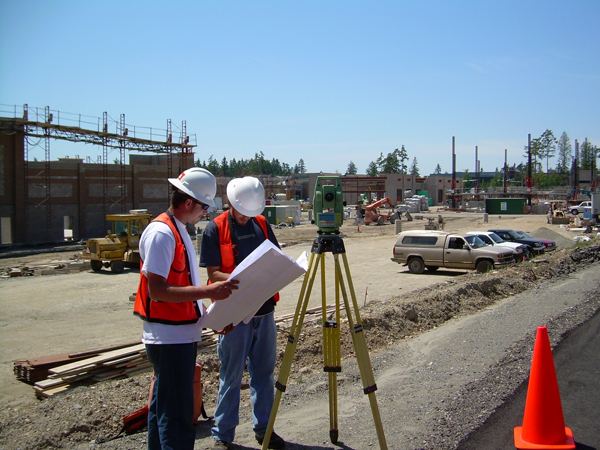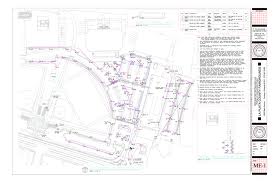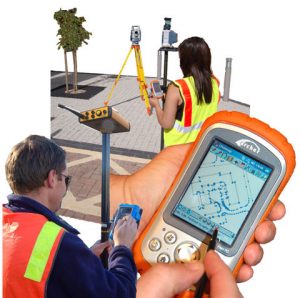Purpose of Construction Surveys
Before construction activities are started, thorough planning and design is carried out. Before and throughout the construction period a surveyor assists in the work progress as necessary. As expected the construction surveyor guides the placement of the constructed items by providing points to the contractor that can be used to place them in the proper location. Thus construction staking is an important piece to the whole construction project.
So, What Is A Construction Survey?
 The following is a brief introduction of what a construction survey is. It is important that contractors building a project should understand at least what it is and its significance to these designed projects.
The following is a brief introduction of what a construction survey is. It is important that contractors building a project should understand at least what it is and its significance to these designed projects.
A Construction Survey is basically a survey that presents locations and marks for construction activities; the process of executing, evaluation, and estimation prior to or during construction activities. It is also known as construction layout, or construction staking. Measurements are done for reference points which determine the location of the planned structure or improvements, vertical and horizontal positioning, dimensions, configuration, and to control the elevation of the new structures.
Purpose of A Construction Survey
The purpose of doing a construction survey is to maintain and establish the necessary vertical and horizontal control points needed for the proper location of the construction items to be built. This survey may also provide measurements which are needed determine quantities as documentation to corroborate the final payments made to the contractor.
Post construction, the survey is used to assess the final position and adequacy of the work, and to compute construction payments and be able to establish “as built” conditions. The “As Built” construction survey is conducted as the construction work is finished to verify the position as specified on the designs and plans.
Tasks Involved in a Construction Survey
Research, Reconnaissance, Control, and Mapping of the project area respectively are the tasks in this phase of an engineering project. This is a preliminary survey which is mainly the collection of data and establishing the survey control scheme that will be used during construction to “control” the position and elevation of each improvement. The result of this work is used for design, detailing of plans, and estimation of the project costs.
Gathering of the Design Data which include Project plans in digital and hard copies, Control Data (Vertical and Horizontal), Alignments (Vertical and Horizontal), New Roadway DTM, R/W data (with maps, descriptions and obligations), and Specifications.
Field Work includes Recovery of existing vertical and horizontal control, Augmentation and replacement of control stations that are necessary to control the construction project, Performing random checks of the vertical and horizontal control network, Checking Vertical controls as necessary, comparison of resultant coordinates to the original, collection of confidence points to check and validate the terrain model, condition documentation, and performing utility relocation surveys as necessary.
 Finally, here is an illustrated example of how a complete Construction Survey looks. The final piece that is presented after the tedious measurements and markings is an as-built topographic survey map which includes all of the vital features illustrated with the contours that represents the elevations. Some projects require these to be done to ALTA survey standards.
Finally, here is an illustrated example of how a complete Construction Survey looks. The final piece that is presented after the tedious measurements and markings is an as-built topographic survey map which includes all of the vital features illustrated with the contours that represents the elevations. Some projects require these to be done to ALTA survey standards.
If you need construction staking or construction surveying for your upcoming building project, please call (614) 591-8665 or fill out our contact form to the right.
How to Choose a Reliable Construction Surveyor
In order for any construction project to be successful, a good construction surveyor should be in on the construction process from start to finish. And, prior to hiring the construction surveyor, you must ensure that he possess adequate skills and is capable of dealing with the complexities of the job. Below are some of the essential things to be considered in order to ensure that your construction surveyor is qualified:
1. A construction surveyor must have experience on similar construction projects.
The main purpose of a construction surveyor involves getting accurate and efficient measurements to ensure that constructed objects are in the correct location on the site. In order to ensure that you are relying on the right person, it is not enough to merely check his license (and you should always insist on a licensed surveyor) but, you must verify that the surveyor has experience on construction sites and that he/she can think on their feet. Situations change very quickly on a construction site and your surveyor should be able to adapt.
2. A construction surveyor must know how to deal with other professionals
Construction surveyors advise contractors, engineers and other professionals while the process of construction is ongoing. While communication is important in most jobs, it is especially so on a construction site. The construction surveyor must have a wide range of knowledge in what the other professionals on the site are doing. This understanding of the job and what is required of the other professionals helps the surveyor to anticipate the needs of the other members of the development team. Sometimes there are also competing interests on a site. For example, the curbing contractor might be different than the paving contractor. Differing grades on the curbing can cost the paving contractor a significant amount of money. This situation can lead to a lot of finger pointing. A diplomatic surveyor can smooth out some of these conflicts.
3. A construction surveyor must have keen attention to details
Even the slightest errors in major construction projects are magnified by the time the project is completed. This usually translates to significant sums of money. This is the reason why the surveyor must ensure great precision in calculating points and in providing instructions. For instance, if an existing building is being expanded, it is extremely important to check the exact location of the building before the addition is begun. This is one of the most common errors in a building addition project.
4. He must be used to multi-tasking
A construction surveyor’s task involves a lot of demands. These demands include initially collecting information regarding the existing site, comparing these existing site conditions to the plans and previous surveys, and preparing to and staking out multiple site improvements. These site improvements may be for multiple contractors, who all make the requests at the same time. Again, it is common for mistakes to happen at this time because of the surveyor possibly rushing the work to satisfy everyone. And, as stated above, site conditions change suddenly which requires sudden alterations in the project and in coming up with an immediate response or an appropriate remedy. Upon the completion of the project, the surveyor checks whether or not the resulting work has been built according to the plans.
Overall, a construction surveyor’s job demands a lot of knowledge, time, skill and energy. Thus, it would be very useful hiring someone with all the aforementioned qualities just to ensure that you are safely leaning on the right person. Moreover, it would be wiser to hire someone who is well-experienced especially in dealing with major construction projects in order to assure success.

